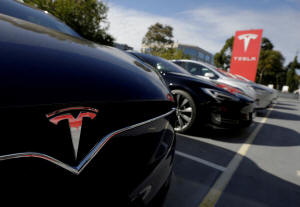|
The
lawsuit claims Tesla’s updates and their effects violate state
and federal laws because they can cut driving range by up to 20%
and can require some owners to replace batteries at a cost of
$15,000.
Tesla did not immediately respond to a request for comment.
The lawsuit, filed in the U.S. District Court in San Francisco,
argues impacted Tesla vehicles are “protected computers” under
the definition outlined in the Computer Fraud and Abuse Act, and
that automatic updates violate consumers’ rights under the law.
"Tesla owners and lessors are uniquely at the mercy of the maker
of their cars, and Tesla imposes software updates without
consent whenever their vehicle is connected to Wi-Fi,” said
Steve Berman, an attorney with Hagens Berman representing Tesla
owners and lessors in the lawsuit.
Attorneys for the owners say automakers generally notify
customers when it wants to perform a software update but Tesla
can issue automatic updates whenever the vehicle is connected to
Wi-Fi.
The lawsuit said some Tesla owners have paid third parties
$500-to $750 to reverse battery-related software updates.
The lawsuit claims Tesla’s updates and their effects violate the
Computer Fraud and Abuse Act, the California Unfair Competition
Law and the Consumer Legal Remedies Act. Attorneys say Tesla
denies reimbursement to Model S and Model X owners and lessors
who experience reduced battery capacity following a software
update.
In July 2021, Tesla agreed to pay $1.9 million to settle claims
a software update temporarily reduced maximum battery voltage in
1,743 Model S sedans, including about $400,000 in attorneys'
fees and expenses.
Owners of the vehicles received $625 each -- "many times the
prorated value of the temporarily reduced maximum voltage,"
according to a court filing.
(Reporting by David Shepardson; Editing by Aurora Ellis)
[© 2023 Thomson Reuters. All rights
reserved.]
This material may not be published,
broadcast, rewritten or redistributed.
Thompson Reuters is solely responsible for this content.

|
|




